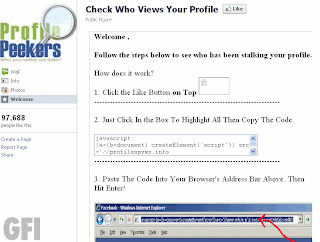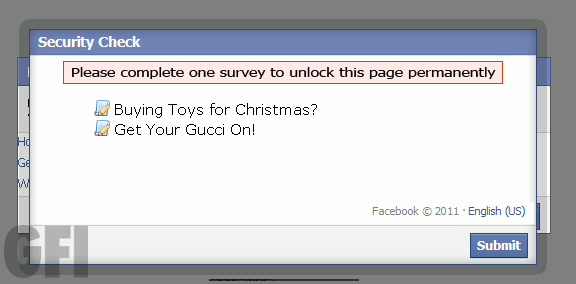No matter how fun and interesting (not to mention newsworthy) Facebook is, the said social networking site has indeed become a haven to a motley of threats, from scams, to nasty apps, to phishing pages. Users who spent much of their time in there would probably be familiar with wall posts from friends or other contacts cajoling them to “see who is stalking you.”
We found a new version of such a post lurking on Facebook recently. In all respects, this “Stalker Tracker” is the same as its predecessors, from the link to where users can find it to displaying (You guessed it) surveys:
What makes this one personal, thus extra special, is not much about hinting on an unnamed “ex” but the somewhat-exciting-if-not-freaking-horrible possibility of that certain someone checking out your profile. Clicking the link found at the bottom of the spam post eventually leads users to profilespyxs(dot)info.
This website contains various other pages. It also has a redirect link to a Facebook page called “Profile Peekers” and a page designed to launch a survey. The “Profile Peekers” page has a section containing JavaScript code where visitors can readily copy from and paste into their Internet browser address bar. This code is responsible for posting the spam on walls, thus, spreading the scam further.
What sets this survey scam apart from the rest of its kind is the way it presents the survey to users. The initial page looks normal:
…until a second splash window is displayed so it sits on top of the first one.
So, what’s the implication of this one to unwary users? More money for the scammer and no reward of putting to rest the thought of whether an ex is viewing profiles or not. In other words, it’s plain ‘ol cake.
All this talk about stalkers and stalking on Facebook is not really a new thing. It was exactly two years ago when Gawker and a popular Facebook-centric site explored the possibility of stalking and wrote about it, which most certainly caused panic to users. The said social networking site had been quick to fix the matter, as one CNET report revealed, rendering the hacks in these sites ineffective and obsolete. Having said that, scams about stalking continue to be popular where Facebook is concerned—as you can see.
Since scams, spams, and other trickeries making rounds on Facebook are growing at an exponential rate, users must make an effort now to educate themselves about them in order to avoid being victims. Help yourself. Then, help your contacts by letting them know about these, too.
Jovi Umawing (Thanks to Christopher Boyd for additional research)




